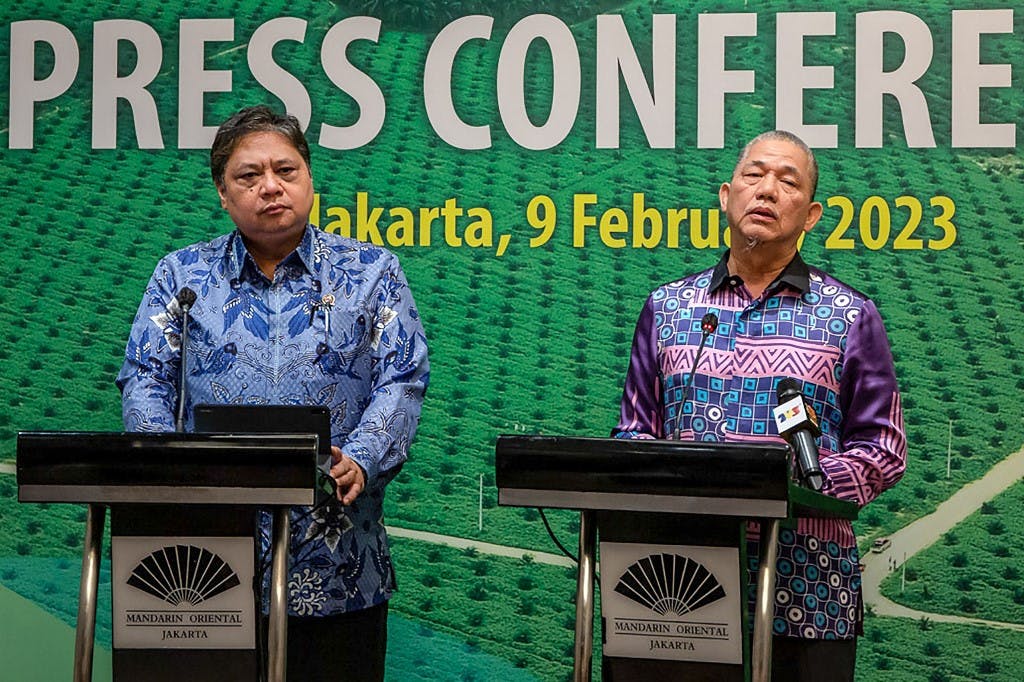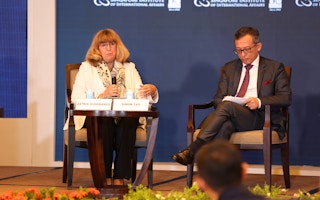The European Union has been “as transparent as it possibly can be” in the lead-up to adopting a law to fight global deforestation, and has been actively engaging producer countries via a stakeholder platform since 2019.
The bloc will continue to keep its listening channels open, and support its Asian trading partners in enabling conditions for deforestation-free production, said Astrid Schomaker, who leads global sustainable development at the European Commission’s directorate-general for environment.
Schomaker’s comments come on the back of fierce criticism, led by Indonesia and Malaysia, of the EU deforestation law that entered into force this month. The legislation, which will allow companies about 18 months to get up to speed with new standards, has triggered the ire of the two major Asian palm oil producers, as it is seen as a deliberate act by Europe to block market access for their commodity exports.
Indonesia and Malaysia have both sent top officials to the EU to voice concern about the law, which they have slammed as “punitive and unfair”.
Schomaker, speaking at the 10th Singapore Dialogue on Sustainable World Resources, organised by a local think tank, on her recent visit to the city-state, told attendees that Malaysia, for example, had participated actively in negotiations while the EU was developing the new law, the first in the world to ban imports of products linked to deforestation, including for cattle, cocoa, coffee, palm oil, soya, wood and rubber. “Of course, I will not hide that the outcome of the legislation is maybe not what Malaysia or other producer countries would appreciate,” she said.
“
The image of palm oil being related to deforestation could be history. The new law tries to cut this link. Consumers in the EU, in the future, will know that products they buy on the market do not lead to deforestation.
Astrid Schomaker, director of global sustainable development, directorate-general for environment, European Commission
A benchmarking system developed by the European Commission – a key feature of the law – has been particularly controversial, Schomaker admitted. Businesses will have to monitor potential deforestation depending on which level of risk their region is in: high, standard or low. However, Schomaker sought to provide clarity for exporter governments that “high risk” countries are not banned entirely from exporting to the EU.
“In fact, [producer countries] can carry out their due diligence as per normal. It just means that checks by the accounting authorities will be more frequent,” she explained.
The EU is also not “inventing something new” by pushing ahead with the EU deforestation law, she said, but ensuring that the “gold standard” – already practised by some of the world’s most sustainable economies – is met by everyone.
“The promotion of transparent and deforestation-free supply chains will also help businesses deliver on their sustainability pledges”, said Schomaker, who added that this effectively helps companies avoid investing in stranded assets and unsustainable supply chains.
Demonstrating ‘the reality of reduction’
Schomaker went on a charm offensive at the event organised by the Singapore Institute of International Affairs (SIIA) to persuade Asian producer countries that small farming businesses stand to benefit from the EU deforestation law.
Using palm oil as an example, she said: “The image of palm oil being related to deforestation could be history. The new law tries to cut this link. Consumers in the EU, in the future, will know that products they buy on the market do not lead to deforestation.”

Indonesia’s coordinating minister for economic affairs Airlangga Hartarto (left) and Malaysia’s Deputy Prime Minister Fadillah Yusof attend a press conference in Jakarta on February 9, 2023. Image: Zae Muhammad / AFP
What producers and smallholder farmers need to show, when the new standards kick next year, is what Schomaker described as the “reality of reduction”, for example providing geolocations which give an indication of where the commodities come from. “Demonstrating this in itself is not expensive for companies and smallholders. Today, it means holding your smartphone and getting this data, then communicating it via a proper system,” she said.
However, Schomaker acknowledged that not every smallholder farmer has a phone, knows how it works or that every region has good data coverage. “Malaysia and Indonesia have been visiting us and they have been very clear about their concerns. We will work with their governments to see what can be done to improve things.”
This includes embarking on new collaborations to “make the new systems work” and look into traceability and transparency within the supply chains in the Asean region.
“We are here to listen to what these countries’ challenges might be…not by conducting megaphone diplomacy, but by sitting at the table, understanding the realities of the commodities supply chain, working together to address problems, and creating sustainable alliances and partnerships that will benefit all, including vulnerable communities.”
Beyond palm oil
The EU regulation on deforestation-free products is part of the EU’s wider Green Deal plan and aims to ensure that across the bloc, consumption does not contribute to deforestation or forest degradation.
Schomaker said the Green Deal was adopted following strong demands from citizens, notably the youngest of all who are “fearful for their future”. “There is great pressure to become greener, and for us to do so with stronger, faster and more determined action,” she said.
As a major consumer market, the EU sees it as its imperative to protect the livelihoods of people who depend on healthy forests for their sustenance. Schomaker added that governments around the world have the resources to take action and foster a more transparent supply chain.
New data increasingly shows Indonesia’s measures to lower deforestation risk in its palm oil supply chains are showing results. Schomaker describes the effort as “very impressive”, but highlighted that even as deforestation levels fall, the rate of tree-felling remains “far too high”.
She also emphasised that the EU deforestation regulation seeks to move beyond palm oil. Recent reports in the media, for example, called out the natural rubber sector for large gaps in deforestation monitoring and traceability data.
While acknowledging how existing certification schemes such as the Roundtable for Sustainable Palm Oil (RSPO) are useful in providing assurance for the sustainability of palm oil production, Schomaker also reminded her audience that palm oil players are required to prove that their products are deforestation-free beyond the current standards, and that certification should not result in producers “deviating from their core responsibilities”.
“And this does not just apply to Asia. In Europe, there are cases where we find that a certified forest is actually the parking space of a supermarket. We need to go beyond certifications,” she said.
Speaking at the same event, Siti Syaliza Mustapha, deputy secretary-general of the Programme for the Endorsement of Forest Certification (PEFC), highlighted that the new EU deforestation regulation is effectively an extension of an existing timber regime implemented by the bloc, and requirements are similar in terms of due diligence.
The PEFC is a non-profit based in Geneva which runs a third-party voluntary certification for forest management, while Siti is based in Malaysia. With the EU deforestation law entered into force, the organisation will work to align its accreditation criteria with EU standards, said Siti.

















